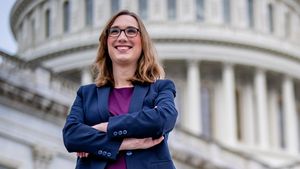Government health
officials began cracking down Wednesday on Internet
sales of custom-mixed hormones for menopausal women, a
market created when doctors deemed prescription
estrogen therapy too risky for many patients.
But the Food and
Drug Administration says these alternative hormone mixes
are no safer, and the agency told seven makers to stop
claiming they are. The FDA also said some mixes
contain estriol, which is illegal to be sold in the
U.S. because the FDA has not approved it for any use.
In letters to the
pharmacies, the FDA said the claims about the
''bioidentical hormone replacement therapy'' (BHRT) products
are not supported by medical evidence and that the
pharmacy operations are breaking the law by making
false and misleading claims about the drugs.
''We want to
assure that Americans receive accurate information about the
risks and benefits of drug therapies,'' the FDA's chief
medical officer, Janet Woodcock, said in a statement.
The agency said
it is concerned that the claims for safety and
effectiveness mislead patients, doctors, and other health
care professionals.
In addition to
citing the menopausal use, some pharmacies claimed the
products could prevent or treat serious diseases, including
Alzheimer's, stroke, and some cancers, the agency
said. Officials said there is no credible evidence to
support those claims.
Kathleen Uhl of
the agency's office of women's health said the FDA does
not know how widely these drugs are used. But she said the
FDA has received a growing number of questions about
them.
Women need to
know that all drugs have both benefits and risks, and that
patients should discuss them with their doctor, Uhl said.
The FDA urges
women to use the lowest effective dose of hormone
replacement drugs that it has approved for menopausal
symptoms, and do so for the shortest time possible.
The agency does
not review compounded, or custom-mixed, drugs for safety
and effectiveness, and encourages patients to use
FDA-approved drugs whenever possible.
A 2002 study
found that replacement hormones made by drug companies
raised the risk of heart attacks, breast cancer, and
strokes. Since then, many women have turned to the
estrogen, progesterone, and testosterone products sold
by compounding pharmacies.
Medical
researchers concluded in 2003 that hormone replacement pills
should be taken only as a brief treatment to help women cope
with the worst symptoms of menopause.
The drug company
Wyeth later complained to the FDA about the Internet
sales of compounded products.
L.D. King,
executive director of the International Academy of
Compounding Pharmacists, charged that the FDA's action
will deny hundreds of thousands of women access to
many commonly compounded bioidentical hormones,
''substituting its judgment for that of doctors.''
FDA officials
stressed that they are not cracking down on all forms of
compounding. Traditional pharmacy compounding involves the
combining or altering of ingredients by a pharmacist,
in response to a doctor's prescription, to produce a
drug tailored to an individual patient's special
medical needs.
In addition, it
said the term "bioidentical" has no accepted meaning.
Warning letters
went to Panorama Compounding Pharmacy of Lake Balboa,
Calif.; Saint John's Medical Plaza Pharmacy of Santa Monica,
Calif.; Murray Avenue Apothecary of Pittsburgh;
Village Compounding Pharmacy of Houston; Pharmacy
Compounding Specialties of Dallas; Reed's Compounding
Pharmacy of Tucson, Ariz.; and Pacifica Pharmacy of
Torrance, Calif. (AP)













































































